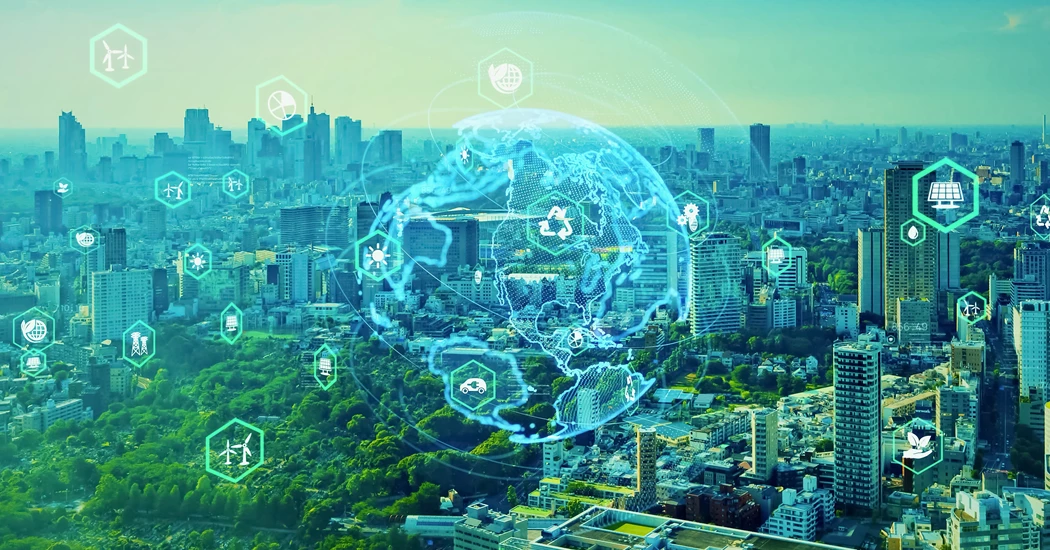COP27: EAD and Department of Energy lead a paradigm shift in Abu Dhabi's energy mix to reduce emissions
The Environment Agency – Abu Dhabi (EAD), in partnership with the Department of Energy (DoE), is leading a fundamental shift in Abu Dhabi's energy mix to achieve significantly lower carbon emissions in the Emirate.
This will be achieved through new regulations aimed at generating a large proportion of Emirate of Abu Dhabi’s electricity from clean and renewable sources by 2035, marking a significant milestone in the UAE’s journey to deliver carbon neutrality by 2050.
The new regulations, drafted by the DoE, will see 60% of the Emirate’s electricity being generated from clean and renewable sources by 2035, and up to 75% reduction in carbon emissions per MWh produced by the electricity sector. The DoE’s ‘Clean Energy Strategic Target 2035 for Electricity Production in Abu Dhabi’ regulatory framework is the first legally binding clean and renewable energy target in the Middle East for the electricity sector. It forms part of an ongoing energy transition to accelerate the UAE’s decarbonisation and green growth efforts.
At a press briefing at the United Nation’s annual climate summit, COP27, in Egypt, Her Excellency Dr. Shaikha Salem Al Dhaheri, Secretary General of EAD, unveiled the new regulations with DoE Chairman, His Excellency Awaidha Murshed Al Marar.
HE Al Dhaheri said the new regulations would promote economic diversification, attract domestic and foreign investment, and encourage technology development and innovations in the clean and renewable energy space.
“The target to produce 60% of all electricity using clean sources by 2035 is an important step towards meeting UAE’s Net Zero aspirations by 2050. Planned investment of billions of dirhams in clean energy infrastructure will be transformative in helping us transition to a low carbon economy with positive environmental and social outcomes. We, at EAD, are working closely with 26 Abu Dhabi entities, including the Department of Energy, as members of ‘The Abu Dhabi Climate Change Taskforce’, to develop climate change policy and related strategic plans to achieve this transformation.”
Several climate change policies and initiatives on the cards
HE Al Dhaheri indicated that the new regulations would contribute to enhancing the efforts made by EAD within the framework of its commitment to the UAE government’s sustainability vision. She added that the EAD is leading a set of framework initiatives to reduce the impact of climate change, including the preparation of the climate change policy for the Emirate of Abu Dhabi and a comprehensive strategy for the years 2023-2027.
Her Excellency also announced that EAD is developing a Nexus decision support system that would allow the Emirate of Abu Dhabi to achieve policy coherence between Water, Environment, Energy and Food. The project would be implemented with the participation of the key custodians of these sectors. This pioneering initiative aims to support the Government of Abu Dhabi in achieving more sustainable utilisation of the natural resources of the Emirate, improved water, energy, and food security and more cost-effective projects and efficient management in the relevant sectors.
Al Dhaheri noted that in the same context, EAD was developing a scheme in which the emissions and trading ceilings would be determined. The feasibility of implementing the system at the state level is being studied to ensure competitiveness and sustainability. To complement this scheme, there would be existing voluntary programmes, such as the electronic platform for trading carbon credits on the Abu Dhabi Global Market. “We hope the emirate will be the first in the region to implement this initiative, which will further strengthen the UAE’s climate leadership role, and support its hosting COP28 next year,” said Al Dhaheri.
Climate benefits of the 60% clean electricity target by 2035
HE Al Marar said the clean energy targets 2035 framework would have a deep impact on the Abu Dhabi energy structure, allowing the broader economy and industrial sector to quickly move in the sustainability direction. “This will open the door to improved added value and increased productivity for local businesses,” he noted. “These decarbonisation policies will help operationalise the UAE net zero 2050 pathways from today. They represent real, live commitments for our people, planet.”
He added that the speed of transition and deployment of 60% clean and renewable electricity by 2035 would be among the most profound globally.
The DoE expects the new regulatory framework to drive a 75% reduction in carbon emissions per MWh produced in Abu Dhabi by 2035, compared to 2016 levels. Abu Dhabi, therefore, will be a leading contributor to the UAE’s updated climate targets to achieve a 31% reduction in greenhouse gas emissions, relative to business as usual, in 2030 and net zero by 2050. The UAE’s new targets were published in its ‘Second Nationally Determined Contribution’ in September ahead of COP27 and as part of the COP26 Glasgow Climate Pact commitments.
Abu Dhabi is already making huge strides in this area. In 2021, the DoE introduced the complementary Abu Dhabi Clean Energy Certificates Scheme as an innovative measure to support carbon footprint reduction of power demand and meet the growing interest of corporate clients and households to contribute to the climate change fight.
“We are very encouraged by the uptake of this scheme. Commercial entities are purchasing clean energy certificates in increasing numbers to claim the use of low or zero emissions electricity, thereby reducing their carbon footprint,” explained Al Marar. “Since electricity generated from clean energy sources is indistinguishable from that produced by any other source, some form of tracking is required. Once the power provider has injected the energy generated from identifiable clean resources into the grid, the Clean Energy Certificates act as a tracking mechanism for the source of clean energy. Entities can then claim the environmental benefits of low carbon energy production in enhancing the sustainable credentials of their product lines.”





